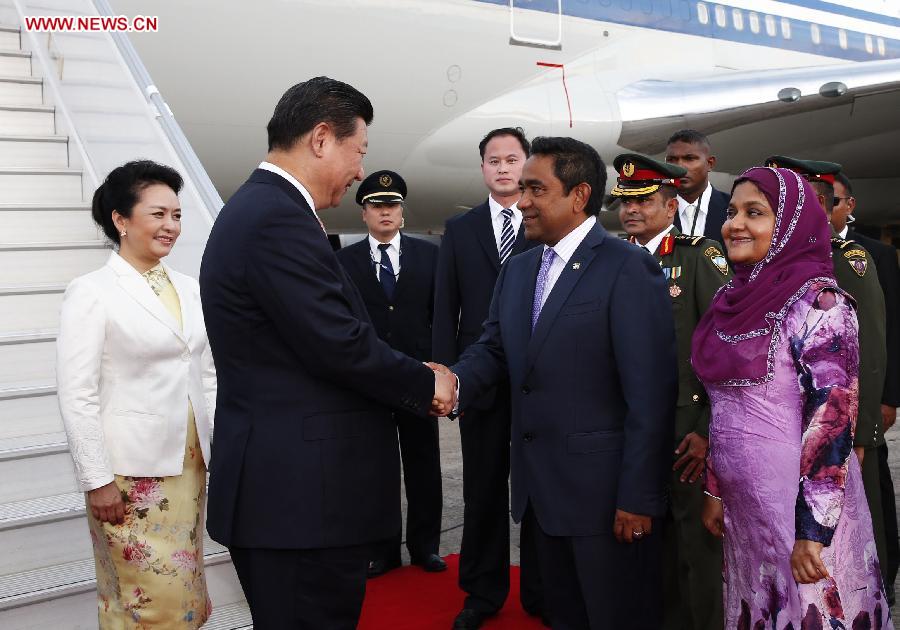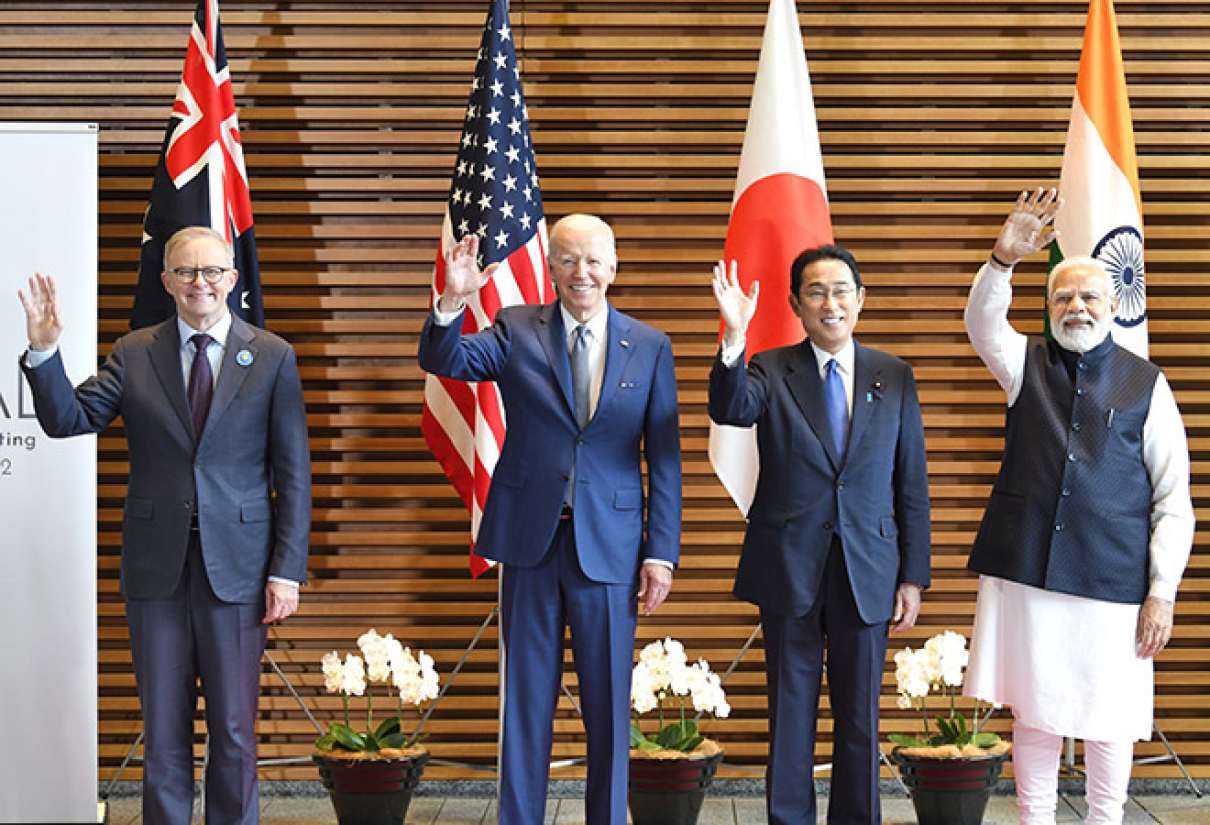The first major foreign policy decision of the new regime of the Maldives led by President Mohamed Muizzu asking New Delhi “to withdraw Indian military personnel” has ominous implications not only for India but also for its three Quad partners – the United States, Australia, and Japan.
QUAD: 6 Reasons Why South Korea Could Become The Fifth Member Of The Quadrilateral Security Dialogue
It is debatable whether this decision is based on perception or reality. New Delhi, no doubt, is sensitive to the developments in Maldives, the small archipelagic nation in the Indian Ocean, located barely 70 nautical miles away from India’s Minicoy island. But it seems difficult to believe that India has stationed its troops there.
Secondly, if Male’s decision has been in accordance with the known pro-China tilt of Muizzu’s Progressive Party of Maldives (PPM), then the decision is not exactly bilateral in scope. It involves a broad geopolitical agenda of the new regime, something that will make Beijing very happy.
In all probability, it is a myth that India has troops in Maldives. India has gifted some aircraft to the island nation, and for their manning and maintenance, there are 77 military personnel. Maldives does not have the required manpower to do those jobs at present.
The Undersecretary for Public Policy of the Presidential Office, Mohamed Firuzul Abdul Khaleel, admitted in his press conference on November 19 that of the 77 Indian military personnel in the Maldives, “24 manage the first helicopter, 25 Indians to manage the Dornier aircraft, 26 personnel to manage the second helicopter, and two more for maintenance and engineering”.
That these personnel are called troops becomes all the more unfathomable when they are only engaged in humanitarian missions, mostly dedicated to providing medical support in transporting patients from remote 200 inhabited islands to regional healthcare centers or the capital’s hospital and conducting search and rescue operations. Reportedly, there have been a total of 977 such missions since 2019.
Interestingly, it is none other than a PPM government, then led by President Yameen Abdul Gayoom (now imprisoned, and Muizzu is widely considered to be his proxy), that had entered into a comprehensive “Action Plan for Defence” with India in 2016. Under this plan, the Indian military personnel were requested to operate the aircraft donated by India till Maldivians were properly trained to operate and manage them.
But that is not all. Muizzu wants a review of this arrangement along with other agreements that India had concluded with the previous Ibrahim Mohamed Solih-led government.
As per the comprehensive Action Plan for Defence was signed in April 2016, India provides the largest number of training opportunities for the Maldivian National Defence Force (MNDF), meeting around 70% of their defense training requirements.
India has trained over 1400 MNDF trainees over the past ten years. MNDF has also been participating in various mil-to-mil activities such as joint EEZ patrols, anti-narcotic operations, SAR (search and rescue), sea-rider program, HADR exercises, adventure camps, sailing regatta, etc. Indian Navy has also provided MNDF with air assets for air surveillance, MEDEVAC (Medical evacuation), SAR, and Helo-borne vertical insertion capability.
India’s defense cooperation also extends to the areas of Joint Exercises, Maritime Domain Awareness, gifting of hardware, infrastructure development, etc.
Key projects in the Maldives’ defense sector include the Composite Training Centre (CTC) for MNDF, the Coastal Radar System (CRS), and the construction of a new Ministry of Defence Headquarters.
During the August 2022 visit of President Solih to India, the supply of a replacement ship for the earlier provided ship-CGS Huravee – to MNDF, the supply of the second Landing Craft Assault (LCA) to MNDF & Gifting of 24 utility vehicles to MNDF was announced. India also handed over 24 utility vehicles to the Maldives in Oct 2022.
Besides, there is the Annual Defence Cooperation Dialogue at the level of Defence Secretary (initiated in July 2016) and Annual Joint Staff Talks. MNDF continues to participate in various forums such as IONS, Goa Maritime Conclave, and Goa Symposium. There are presently three major joint exercises with Maldives that are held regularly.
MNDF regularly participates in Humanitarian Assistance & Disaster Relief, Search & Rescue (SAR), Pollution Control, and other exercises organized by New Delhi. India has provided pollution dispersant to the MNDF Coast Guard.
New Delhi is also undertaking customized training for the MNDF Fire and Rescue Service in India. In fact, during Aug 1-4, 2022, the official visit of President Solih to India, an MoU for cooperation in the field of disaster management between NDMA, India, and NDMA, Maldives, was signed.
India also provided a $50 million credit line to the Maldives in 2021 for defense projects, and a pact was signed to build the Uthuru Thila Falhu harbor. New Delhi is also developing its presence in Addu in the south, including constructing a new police academy and plans to open an Indian consulate there.
It is in tune with India’s commitment to capacity building in the Maldives that Indian defense minister Rajnath Singh, during his visit in May this year, had gifted one Fast Patrol Vessel ship and a Landing Craft to the Maldives National Defence Forces.
However, the PPM, which is supposedly under the firm control of former President Yameen, whose regime in 2014-18 had allowed China to make a huge presence in the country at the cost of India, made “India Out” a major slogan during the electioneering in September successfully.
It argued that by intensifying military cooperation with India and bringing the Indian military personnel and platforms to the country, the Solih government compromised on the country’s sovereignty and made the Maldives “a slave of India.”
But then, as has been pointed out, it seems to be more of rhetoric than reality. The Solih regime, as a matter of fact, was implementing the agreements that Yameen had made with India as the President.
Even on the contentious issue of Uthuru Thila Falhu, the fact remains that India is helping in the building of this Maldives National Defence Force Coast Guard Harbor, for which the PPM government, then led by Abdul Gayam, had requested in 2013 as part of enhancing the capability of the Maldivian Defence forces. The agreement to this effect was signed by Yameen himself in 2016.
India’s security cooperation is open and transparent in the sense that it is also a part of trilateral maritime security cooperation involving Sri Lanka. This trilateral collaboration among India, Sri Lanka, and the Maldives is designed to initiate collective action on maritime security, including maritime domain awareness, legal regimes, training in search and rescue, maritime pollution response, information sharing, curbing piracy drugs arms and contraband trafficking and unregulated fishing.
And this is said to be extremely beneficial for Maldives, which is critically dependent on the ocean for domestic food security and exports (particularly fish and related products).
But then, given the politicization of India – a factor in Maldives’ competitive politics in which the Maldivian Democratic Party (MDP) government and leaders are viewed as pro-India by the Yameen-led PPM, President Muizzu‘s decision on reviewing policies towards New Delhi is understandable.

And here, the China factor comes in. After all, it was during Yameen’s regime that China made strong inroads in Maldives. Under its Belt and Road Initiative (BRI), China established a series of new infrastructure projects in the Maldives.
Of course, Chinese investments through loans had reached nearly $1.5 billion, a high figure for a nation with a GDP of less than $9 billion. That the succeeding MDP government had to work very hard to get untangled from the Chinese debt trap is a different matter. But Yameen’s love for China remains unabated.
The MDP government under President Ibrahim Mohamed Solih had also expanded the country’s diplomatic horizon, particularly with major countries like Japan, Australia, and the United States.
In September 2020, Washington signed a new defense framework agreement with Male. The next month—in one of the last major Asia policy decisions made by the Trump administration—Secretary of State Mike Pompeo announced that America would establish its first embassy in the Maldives. Washington has also stepped up maritime cooperation with Male—including the provision of nearly $11 million in assistance—since 2018.
In fact, in September this year, the month Maldives witnessed the Presidential elections, the US established an embassy in Male and sent career diplomat Hugo Hue-Ho Yon as its first resident US ambassador.
Similarly, Australia officially opened up an embassy in Maldives in May this year. Japan also started giving more attention to Maldives, two countries’ foreign ministers meeting twice in each other’s capital this year alone.
If one goes by the statements of the officials in the US, Japan, and Australia, they all share the same outlook as far as Maldives is concerned. Maldives is seen in the context of their coordinated Indo-Pacific policy of a “Free and Open Indo-Pacific (FOIP)” based on the rule of law, democratic values, maritime safety, and security. They all want to prevent the region from being dominated by” a single hegemon or coalition of powers.”
In fact, a US Congressional report has argued that to arrest the growing Chinese influence in the Maldives, like-minded Quad and “democratic” partners must join hands with India in not only furthering the cause of democracies in the region but also enhancing security collaborations among themselves.

Obviously, China was not at all happy with all these developments that took place when Maldives was under the MDP government. Chinese experts talked of “geopolitical opportunism in the Maldives” by the US.
They viewed the opening of the US embassy in the Maldives as part of the American strategy of “seeking breakthroughs in its Indo-Pacific Strategy to counter China’s growing influence in the region.”
China also thinks that “US moves in the Maldives have the Indian backing in the wake of changing regional dynamics. In recent years, India, which has viewed the Maldives as its backyard, sees China’s footprint in South Asia and the Indian Ocean as a challenge to its dominance in the region. India wants to bring the US into the region to check China’s rise”.
It is against this background that China has every reason to be happy that its favorite PPM has recaptured power in Maldives. Therefore, undoing or reviewing all the policies and decisions of the Solih regime by the new President Muizzu will have Beijing’s blessings, if not promptings.
- Author and veteran journalist Prakash Nanda is Chairman of the Editorial Board – EurAsian Times and has commented on politics, foreign policy, and strategic affairs for nearly three decades. A former National Fellow of the Indian Council for Historical Research and recipient of the Seoul Peace Prize Scholarship, he is also a Distinguished Fellow at the Institute of Peace and Conflict Studies.
- CONTACT: prakash.nanda (at) hotmail.com
- Follow EurAsian Times on Google News




